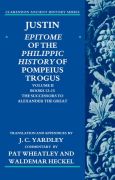
Justin: epitome of the philippic history of pompeius trogus: volume ii: books 13-15:the successors to alexander the great
Yardley, J. C.
Pompeius Trogus, a Romanized Gaul, wrote a forty-four book universal history(The Philippic History) of the non-Roman, Mediterranean world, which was later abbreviated by M. Junianus Justinus. This volume supplies a historical analysis of this unique source with a full translation and running commentary on Books 13-15. Pompeius Trogus, a Romanized Gaul living in the age of Augustus, wrote a forty-four book universal history (The Philippic History) of the non-Roman Mediterranean world. This work was later abbreviated by M. Junianus Justinus.Alexander the Great's life has been examined in minute detail by scholars formany decades, but the period of chaos that ensued after his death in 323 BC has received much less attention. Few historical sources recount the history ofthis period consecutively. Justin's abbreviated epitome of the lost Philippichistory of Pompeius Trogus is the only relatively continuous account we have left of the events that transpired in the 40 years from 323 BC. This volume supplies a historical analysis ofthis unique source for the difficult period of Alexander's Successors up to 297 BC, a full translation, and running commentary on Books 13-15. INDICE: List of Maps List of Tables Abbreviations Introduction Books 13-15Sources for the Age of the Successors and their Use by Trogus The Chronology of the Period 323-297 bc Translation Book 13 Book 14 Book 15 Prologues 13-15 Commentary Book 13 Book 14 Book 15 Prologues 13-15 Appendices I Fragments of Pompeius Trogus II Texts Relating to the History of the Successors III Eumenes Speech to His Army IV The Language of Justin and Trogus Livian-Trogan Expressions in Books 13-15 Non-Livian Trogan Uses in Books 13-15 Justinisms in JustinPoetic Usages What Justin Omits Index
- ISBN: 978-0-19-927760-5
- Editorial: Oxford University
- Encuadernacion: Rústica
- Páginas: 384
- Fecha Publicación: 15/12/2011
- Nº Volúmenes: 1
- Idioma: Inglés
